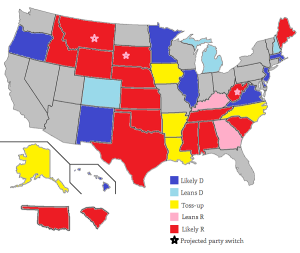Senator Thad Cochran’s victory last night in Mississippi does not affect Republican prospects in the fall very much. As we discussed when state Sen. Chris McDaniel forced Cochran into a runoff three weeks ago, the GOP would be likely to hold the Magnolia State regardless of which candidate prevailed.
Videos by Rare
But there is a small, indirect effect on the wider race for the Senate, and it helps explain why McDaniel’s challenge to Cochran was so annoying to some establishment Republicans. The national party no longer needs to worry about spending money in Mississippi.
If McDaniel had won, Democrats would have placed a longshot bet on moderate former Congressman Travis Childers. The theory would be that McDaniel might be prone to some major misstep that would throw the race into play. It was a stretch, but if the Democratic Senatorial Campaign Committee had decided to spend money on Misssissippi, the National Republican Senatorial Committee would feel compelled to respond.
NRSC operatives in Washington couldn’t understand why anyone would want to force them to throw resources into a safe state. There was a slightly irrational quality to this line of reasoning, even beyond the deafness to tea party concerns about the fiscal habits of comfortable old appropriators like Cochran.
After all, assuming a little risk in a safe state seems preferable to a bigger risk in a more marginal state. Recall Indiana in 2012, where incumbent Sen. Richard Lugar was picked off by a tea party insurgent, Richard Mourdock, who went on to lose the race.
Fundraising numbers released on Friday make the establishment anxiety a bit more intelligible. Democrats are outraising Republicans. While the NRSC raised $5.8 million in May and has $22.1 million cash on hand, the DSCC raised $8.3 million in May and has $28.1 million on hand.
(Upside: The DSCC does have a mortgage to pay on newly expanded office space while the NRSC is debt-free.)
That gives Democrats a bit more room to play in marginal states, and partially explains why the NRSC decided to back Cochran against McDaniel. They spent money in Mississippi this month to save resources for the toss-up states a few months down the line (sooner, really; the parties have already begun reserving airtime for autumn advertisement).
That calculation may prove somewhat shortsighted. Cochran’s unorthodox victory strategy — partially dependent on microtargeting aimed at Democratic crossover voters — was brilliantly effective, but it’s also likely to cause lasting resentment among McDaniel supporters.
To the extent that activists ready to open their wallets sympathize with that resentment, it may mean less money for the NRSC and more for outside groups who might not necessarily mobilize their resources as efficaciously. Indeed, the failure of national tea party groups to push McDaniel to victory — he was ahead in the first round of voting, remember — helps illustrate the efficacy gap.
The GOP’s chances of retaking the Senate are good, but far from certain. The map below shows a target-rich environment, but if Republicans don’t hit their targets, it might be because they were aiming at each other.



